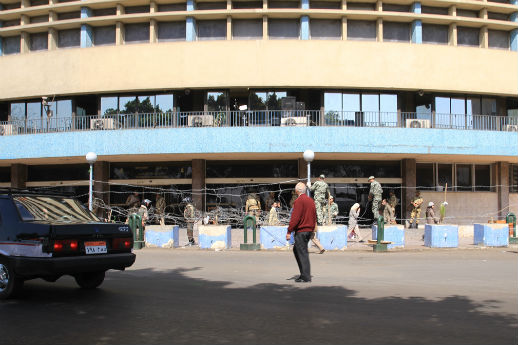
World Watch Monitor
Coptic organisations outside Egypt commemorate this weekend the 5th anniversary of an attack by the Egyptian Army against a peaceful Christian protest march, which resulted in 27 Copts killed and scores of others injured. Known as the “Maspero massacre” it mainly took place (on 9 Oct. 2011) outside the huge headquarters of the Egyptian Radio and Television Union (ERTU), the Maspero building.
Plans this week by US-based Coptic Solidarity (CS) include a “Remembrance Day” in Washington DC for the Maspero victims, as well as for victims of attacks against Egyptian Christians dating back to 1971: including riots, church attacks across Egypt, and the ISIS slaughter of 21 men on a beach in Libya in 2015.
In Mississauga, Canada, another group of Copts will keep alive the memory of the dead with participants of their community in the Toronto metropolitan area.
These events held overseas come even as another to remember the Maspero victims at home was turned down by the authorities: a request to hold a vigil was refused due to unexplained “security reasons”, said Copt activists, including Maspero Youth Union (MYU).
“Authorities’ intransigence in rejecting our request for a permit to gather denies us the exercise of our legal rights. It forces us to wait for a lengthy judicial appeal, which, even if granted, would [for] sure be after the anniversary has long passed,” MYU said, noting that some activists have already been threatened.
The ‘mayhem’ at Maspero
On the evening of Sunday 9 Oct 2011, protesters, mainly Copts, were making their way to stand outside the Egyptian state Radio and TV broadcast building, when they were violently intercepted by agitators in “plain clothes”, who pelted them with rocks, before the Army itself then opened fire on them.
The main attack took place a mile from Tahrir Square, which in January of that year had seen a popular uprising that had ousted the long-time ruler, Hosni Mubarak. At the time, the Supreme Council of Armed Forces was running Egypt on an interim basis, until elections brought the Muslim Brotherhood to power.
The Copts were protesting at the demolition of a church a month earlier by extremist Muslims in the south of the country.
What began as a peaceful protest ended up with protesters first pelted by rocks, before at least two Army vehicles were videotaped mowing down as many Christians as possible by its zigzag movement.
The attack by the Army was joined by calls on the country’s national TV for “noble citizens” to come out in support of the Army against Copts – who were described as attacking soldiers.
Several human rights organisations and eyewitness accounts confirmed the Army began by shooting into the crowd and ramming riot-control vehicles into the protestors.
Based on corroborated evidence, a report by Egypt’s National Council for Human Rights on 2 Nov. 2011 concluded that the state TV coverage was “clearly inciting and antagonising against Christians” during Maspero.
It confirmed that military police units stationed at Tahrir Square allowed agitators in “plain clothes” to enter the foray armed with clubs, crowbars and machetes, while chanting “Islamic anti-Christian slogans”.
“Groups of assailants in plain clothes were shouting ‘Find the Christians! We Muslims here we come!’, and ‘The military and the people are one hand against the Christians!'” People in the streets were “systematically stopped and attacked once they were found out to be Christians,” the report said.
Other unconfirmed accounts spoke of a hunt for Christians in neighbouring buildings, with office employees trying to hide Christians from security personnel in pursuit of them.
Since 2011, the authorities have been urged to bring those responsible for the killings to justice.
An initial investigation by the Army failed to condemn Army actions. To date, only two low-ranking soldiers were found guilty of “involuntary killing.” According to CS, both remain free and continue to serve in their Army unit, while a Coptic demonstrator was convicted of “aggression against Army personnel”.
The Maspero protest came after a slew of attacks against Copts, which have not stopped since.
From 25 January 2011 to July 2016, from Sinai in the northeast to Luxor in the south, the Egyptian Initiative for Personal Rights has counted at least 78 incidents where Copts were killed, nearly killed, injured, or repeatedly suffered material damages – prompting a prominent Coptic bishop to recently describe the country as “diseased” with discrimination.
Cases of intimidation and abductions for ransom of Copts have also increased to hundreds in recent years.
The building of churches is another sore point: those who apply to build a Christian place of worship face endless bureaucracy to get a permit, while mosques routinely spring up across the country with the least inconvenience. A new law that was hoped to solve the issue of church construction has to date failed to produce a clear break with the past.